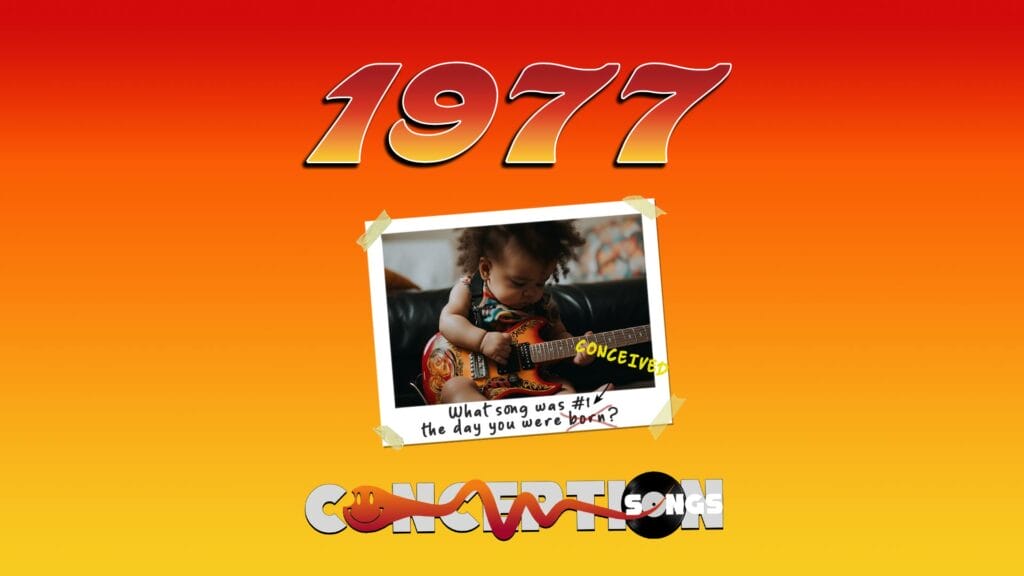 |
Born In 1953?
|
| ‘Pondering the unicorn’ is just one way to describe how a man and woman, who love each other very much, shard the marital bed. Your Mom and Dad ‘pondered the unicorn’ and a lot of other stuff, nine months ago. Check the date to find the # 1 song when you were conceived! |
Born on January 1, 1953 – February 20, 1953
|
| “Wheel of Fortune” isn’t just a song—it’s a sultry soiree dressed up in a melody that is as electrifying as it is captivating. Starr’s enticing voice, coupled with the thrilling orchestration and the tempting rhythm, makes for a tune that’s as tempting as a midnight game of chance. This song is a daring bet, a tempting offer, a flirtatious game of chance—an enticing serenade that promises that in the game of love, every spin of the wheel could be your lucky break. It’s a double entendre-filled piece that’s sure to spin your senses. |
Born on February 21, 1953 – April 3, 1953
|
|
Georgia Gibbs’ “Kiss of Fire” is a scintillating tune that crackles with a sizzling intensity as tantalizing as a roasting marshmallow over a campfire. This song, much like a secret shared over hot cocoa on a winter’s night, packs a playful punch of passion that’s as cheeky as it is irresistible. Gibbs’ voice is a delightful treat, her vocals as rich and warming as a sip of hot mulled wine on a chilly evening. Each lyric is delivered with a fiery zest, her words dancing over the melody with a mischievous sparkle in her voice. Her vocals, smooth and feisty, engulf the listener in a spicy embrace that leaves you feeling both warm and wonderfully flustered. The orchestration is the spark that lights this musical bonfire. The lively strum of the guitar, the bold strokes of the piano, and the passionate beats of the percussion all come together to create a soundtrack that’s as hot as a summer barbecue. Each note is a cheeky wink, a playful nudge, a passionate kiss of fire that enhances the song’s captivating allure. |
Born on April 4, 1953 – March 6, 1953
|
|
Anderson’s composition captures your imagination, the melody twirling around your senses like a dancer’s flowing dress. Each beat is a tempting invitation, a rhythmic flirtation that whisks you off your feet and into a dance that’s as captivating as it is engaging. The orchestration is a masterful conductor in this midnight dance. The gentle sigh of the strings, the sensual murmur of the woodwinds, and the steady pulse of the percussion all come together to create a musical landscape that’s as evocative as a moonlit ballroom. Each note is a soft caress, a tender touch, a coy glance that enhances the song’s alluring appeal. The rhythm of “Blue Tango” is an intimate waltz, a seductive rhythm that ebbs and flows like the tide under a crescent moon. The tempo, steady yet enchanting, carries you along on its graceful journey, each beat a shared moment, a playful twirl, a passionate embrace. |
Born on March 7, 1953 – March 20, 1953:
|
| “Kiss of Fire” isn’t just a song—it’s a flirty conversation adorned with a melody as fiery as a sizzling salsa dance. Gibbs’ captivating voice, coupled with the sizzling lyrics and the vibrant rhythm, makes for a tune that’s as spicy as it is sweet. This song is a playful dare, a shared secret, a tempting offer delivered with a wink and a smirk—an enchanting serenade that promises that love’s kiss might be fiery, but it’s one you’ll want to come back for, like a perfectly toasted marshmallow. It’s a PG-rated piece that’s sure to ignite your senses. |
Born on March 21, 1953 – March 26, 1953:
|
|
Day’s voice captures your heart, her vocals as light and charming as a fluttering butterfly on a summer’s day. Each lyric is delivered with a twinkle in her voice, her words playfully dancing over the melody like a feather caught in a breeze. Her vocals, sweet and teasing, tiptoe around the listener, offering a flirty wink that is as tantalizing as it is endearing. “A Guy Is A Guy” isn’t just a song—it’s a cheeky conversation dressed up in a melody as frothy as a root beer float. Day’s enchanting voice, coupled with the playful lyrics and the upbeat rhythm, makes for a tune that’s as sweet as it is sly. This song is a flirtatious wink, a shared secret, a playful jest—an enchanting serenade that promises that the dance of love might be a mystery, but it’s a game that’s always worth playing. |
Born on March 27, 1953 – April 3, 1952:
|
|
Al Martino’s “Here in My Heart” is a delightfully heartfelt tune that resonates with a romantic intensity as thrilling as finding a love note tucked inside a lunch box. This song, akin to a shared gaze across a crowded room, is a seductive whisper of affection that’s as charmingly subtle as it is arresting. Martino’s voice is a tender invitation, his vocals as warm and inviting as a cozy blanket on a cold day. Each lyric is sung with a love-laden lilt, his words dancing over the melody with a subtle double entendre that is as titillating as it is endearing. His vocals, smooth and yearning, wrap around the listener, delivering a message that is as straightforward as it is suggestive. |
Born on April 4, 1953 – April 11, 1953:
|
|
Faith’s composition captivates your senses, the melody swirling around your mind like a feather in the wind. Each beat is a flirtatious wink, a rhythmic nudge that teases your curiosity and invites you into a dance that’s as captivating as it is mysterious. “Delicado” isn’t just a song—it’s a subtle flirtation hidden in a melody as refreshing as a summer spritzer. Faith’s enchanting composition, coupled with the teasing rhythm, makes for a tune that’s as lighthearted as it is intriguing. This instrumental number is a secret message, a whispered promise, a delicate tease—an enchanting serenade that promises that the dance of love might be delicate, but it’s a dance that’s always worth taking. |
Born on April 18, 1953 – May 2, 1953:
|
| The rhythm of “Auf Wiederseh’n Sweetheart” is a slow dance, a rhythm that sways with the solemn grace of lovers parting under a moonlit sky. The tempo, slow and bittersweet, guides you through its poignant journey, each beat a stolen glance, a silent promise, a tender farewell. Lynn’s enchanting voice, coupled with the moving lyrics and the delicate rhythm, creates a tune that’s as emotionally charged as it is enticing. This song is a passionate farewell, a whispered promise, a lingering touch; an enchanting serenade that reassures you that goodbyes might be sorrowful, but they’re also moments of tantalizing anticipation for the next reunion. |
Born on May 3, 1953 – May 23, 1953:
|
| The rhythm of “Half as Much” is a joyful jig, a rhythm that bounces with the ebullient rhythm of a heart in love. The tempo, lively and infectious, carries you along on its merry journey, each beat a shared smile, a flirtatious quip, a loving caress. |
Born on May 24, 1953 – June 19, 1953:
|
| Vera Lynn’s “Auf Wiederseh’n Sweetheart” is a tantalizing tune that simmers with a romantic longing as intoxicating as a stolen kiss under the stars. This song, much like a secret love letter hidden within a book, is a seductive whisper of farewell that’s as poignantly beautiful as it is arousing. |
Born on June 20, 1953 – June 26, 1953:
|
| Fisher’s mesmerizing voice, coupled with the profound lyrics and the slow rhythm, creates a tune that’s as heartrending as it is seductive. This song is a yearning call, a shared memory, a soft sigh—an enchanting serenade that reassures you that distance might be a challenge, but it only makes the heart grow fonder. |
Born on June 27, 1953 – July 24, 1953:
|
| From the moment Stafford starts singing, her voice reverberates with a chilling determination, her vocals as intense and unwavering as a gaze that never leaves your form. Each lyric is sung with an uncanny insistence, her words trailing over the melody with a commanding echo that sends chills down your spine. Her vocals, alluring yet relentless, wrap around the listener like a cloak, delivering a message that’s as starkly possessive as it is oddly enticing. |
Born on July 24, 1953 – August 28, 1953:
|
| Patti Page’s “I Went to Your Wedding” is a melancholy tune that resonates with a jealousy as potent as a secret love letter found in a forgotten drawer. This song, much like a tear-streaked face hidden behind a lace veil, is a bittersweet confession of unrequited love that’s as heartrending as it is tantalizing. It’s a tear-streaked confession hidden in a melody as bittersweet as a final goodbye. Page’s heart-wrenching voice, coupled with the poignant lyrics and the sorrowful rhythm, creates a tune that’s as heartbreaking as it is seductive. This song is a painful admission, a concealed jealousy, a somber sigh—an enchanting serenade that reminds you that love might be a joyous celebration for some, but for others, it’s a poignant reminder of what could have been. |
Born on August 29, 1953 – September 4, 1953:
|
|
Johnny Standley’s comedic monologue record, “It’s In The Book (parts 1 & 2)” is an amusing narrative that takes listeners on an absurdist journey filled with satire and wit. It’s divided into two sections – the first part is a mock-sermon, and the second part is a rendition of the nonsensical children’s rhyme, “Grandma’s Lye Soap”. Part 1: The Mock-Sermon Part 2: Grandma’s Lye Soap |
Born on September 5, 1953 – October 2, 1953:
|
|
As we delve into the lyrics, we see the singer continuously reassure their beloved that their love is true and everlasting. James sings “Why don’t you believe me? It’s you I adore,” and further adds, “Forever and ever, can I promise more?” These lines establish the song’s central theme of a love that’s questioned or doubted. The line “I’ve told you so often the way that I care” indicates a continuous effort by the singer to make their feelings known. The fact that they need to repeat these assurances suggests a disconnect, where the singer’s feelings are not being acknowledged or believed by the other party. The lyrics also hint at the singer’s frustration and desperation as they keep trying to convince the beloved of their true feelings. Phrases like “Why don’t you believe me? Why do you doubt?” underline the singer’s bafflement and confusion about why their confessions of love are not being accepted as true. |
Born on October 3, 1953 – October 16, 1953:
|
|
Our young protagonist sneaks down the stairs, the soft glow of the Christmas tree lights guiding their path, perhaps hoping to catch a glimpse of jolly Saint Nick himself. The scene unfolds as the child peers from behind a corner or maybe from the banister above, their eyes wide with the innocence and awe of youth. Much to the child’s surprise, there under the mistletoe, they see their mother sharing a tender moment with Santa Claus, completely unaware of the small, curious eyes watching the scene. The child, understanding Santa as a separate entity, doesn’t realize that it’s their father dressed up as Santa, and so, confusion ensues. In their young mind, this scenario may raise questions, or perhaps it sparks a sense of joy, thinking that their mother is so special that even Santa Claus himself would pause his busy night to share a sweet moment with her. The song captures the innocent interpretation of what they witnessed, portraying the magic of the holiday season through a child’s eyes. This childhood misunderstanding is what gives the song its charm and humor, making it a beloved holiday classic. |
Born on October 17, 1953 – November 20, 1953:
|
|
This song, much like a lover’s whisper that teases the shell of your ear, is a passionate plea that’s as electrifying as it is enthralling. From the moment Como’s rich baritone vocals fill the room, an undeniable shiver of anticipation travels down your spine. Each lyric is delivered with a smoldering intensity, his words sliding over the melody with an allure that’s as irresistible as a lingering touch tracing the curve of your bare skin. “Don’t Let the Stars Get in Your Eyes” is not just a song—it’s a sensual confession cloaked in a melody as enticing as a forbidden fruit. Como’s seductive voice, coupled with the suggestive lyrics and the provocative rhythm, crafts a tune that’s as intoxicating as it is magnetic. This song is a passionate plea, a sensual tease, a flirtatious sigh—an enthralling serenade that tempts you to let go of your inhibitions and surrender to the allure of the night. |
Born on November 21, 1953 – December 26, 1953:
|
|
The song starts off with the line, “Till I waltz again with you, let no other hold your charms,” immediately expressing the singer’s fear of losing their loved one to someone else during their time apart. This establishes a sense of longing, loss, and an element of insecurity. The following lines, “If my dreams should all come true, you’ll be waiting for my arms,” indicates hopefulness and optimism. The singer is dreaming of a future where they reunite with their beloved, indicating a deep emotional bond. The refrain, “Till I kiss you once again, keep my love locked in your heart,” amplifies the longing and emotional depth of the song. Here, Brewer requests her beloved to keep her love safe and secure until they meet again. It’s a pledge of enduring love and fidelity, indicating a deep emotional connection. The final lines, “Darling, I’ll be true till I waltz again with you,” reiterate the theme of faithfulness and longing for reunion. It’s a testament to Brewer’s commitment to her beloved, expressing a yearning that’s both deep and poignant. |
Born on December 27, 1953 – December 31, 1953:
|
|
If one were to describe it as a culinary dish, this song would be a light pastry puff, filled with sugary innocence, shaped like a whimsical dog biscuit, and topped with a light dusting of musical magic. It’s as if a children’s book collided with a pet store advertisement and then decided to dance to a cheery tune. In the realms of the musical ecosystem, “The Doggie In The Window” might be the playful otter, sliding down the riverbank of rhythm, effortlessly keeping afloat on the waters of melody. The lyrics bubble up like a well-carbonated drink of nostalgia, fizzing with the innocent charm of yesteryears. From a narrative standpoint, the song is an unexpected treasure chest found in a pirate-themed playground. It’s less about the jewels of complex lyricism and more about the joyous discovery of simple delights. The song doesn’t delve into the pirate’s life; instead, it presents a child’s game of make-believe. The song’s melody is as catchy as a bouquet of velcro flowers. It sticks to you with a persistence that’s both endearing and slightly baffling, much like a puppy chasing its own tail. The orchestration is a sprinkle of vanilla on a musical sundae, sweet but never cloying. As for the lyrics, they’re as straightforward as a Labrador Retriever racing towards a frisbee. The titular doggie is the hero of the piece, an emblem of simple domestic desires and companionship. It’s a lighthearted love letter to a potential pet, offering a window, so to speak, into the world of mid-century American life. All in all, “The Doggie In The Window” is a charmingly quirky musical time-capsule, offering listeners a taste of simplicity and innocence akin to a soft serve ice cream on a sunny Sunday afternoon. It’s not complex or filled with hidden layers, but sometimes, much like that hopeful doggie behind the glass, simplicity is the most appealing choice. |
This Year’s Euphemism: Putting the doggie in the window |
1953 was a sensational year, a spicy mix of scandal, style, and sex symbols. A bit too steamy, wouldn’t you agree?
|
|
The average length of human gestation (Your ‘Conception Era’) is 280 days, or 40 weeks, from the first day of the woman’s last menstrual period. The medical term for the due date is the estimated date of confinement (EDC). If you were born late or a bit premature, add or subtract those days. |


